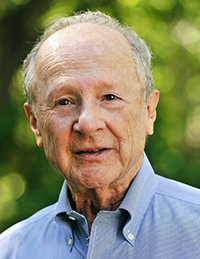Matthew Meselson, Ph.D.
Matthew Meselson is a pioneer in molecular genetics who laid the groundwork for the study of DNA replication, recombination, restriction, and repair. His contributions in the laboratory are matched by his commitment to the international prohibition of biological and chemical weapons.
In 1958, Dr. Meselson and his colleague Franklin Stahl published the results of one of the most elegant experiments in modern science, demonstrating that DNA replicates semi-conservatively. The method they devised to uncover this truth they called equilibrium density gradient centrifugation. Dr. Meselson went on to use this method to solve several key mysteries of DNA.
In 1961, with Sydney Brenner and François Jacob, he established the existence of messenger RNA. He also shed light on genetic recombination, found and characterized the first restriction enzyme, and predicted how cells repair mistakes in their DNA. His current research is in the area of molecular population genetics and evolution.
For more than 50 years, Dr. Meselson has been an effective advocate of measures to prevent biological and chemical warfare and the hostile exploitation of biology. He served as a consultant to numerous government agencies, played a significant role in the 1969 decision of President Nixon to renounce biological and toxin weapons and to terminate the military use of herbicides in Vietnam, and led on-site international investigations into alleged violations of the Biological Weapons Convention.
Born in Denver, Colorado, Dr. Meselson received a Ph.B. degree from the University of Chicago in 1951 and a Ph.D. degree from the California Institute of Technology in 1957. He was Assistant Professor of Physical Chemistry at Caltech before joining the faculty at Harvard University in 1960. Today, he is Thomas Dudley Cabot Professor of the Natural Sciences at Harvard.
Dr. Meselson is a member of the National Academy of Sciences, the National Academy of Medicine, the Royal Society, and other international scientific societies. He has received many honors, including the 2004 Albert Lasker Award for Special Achievement in Medical Science.
